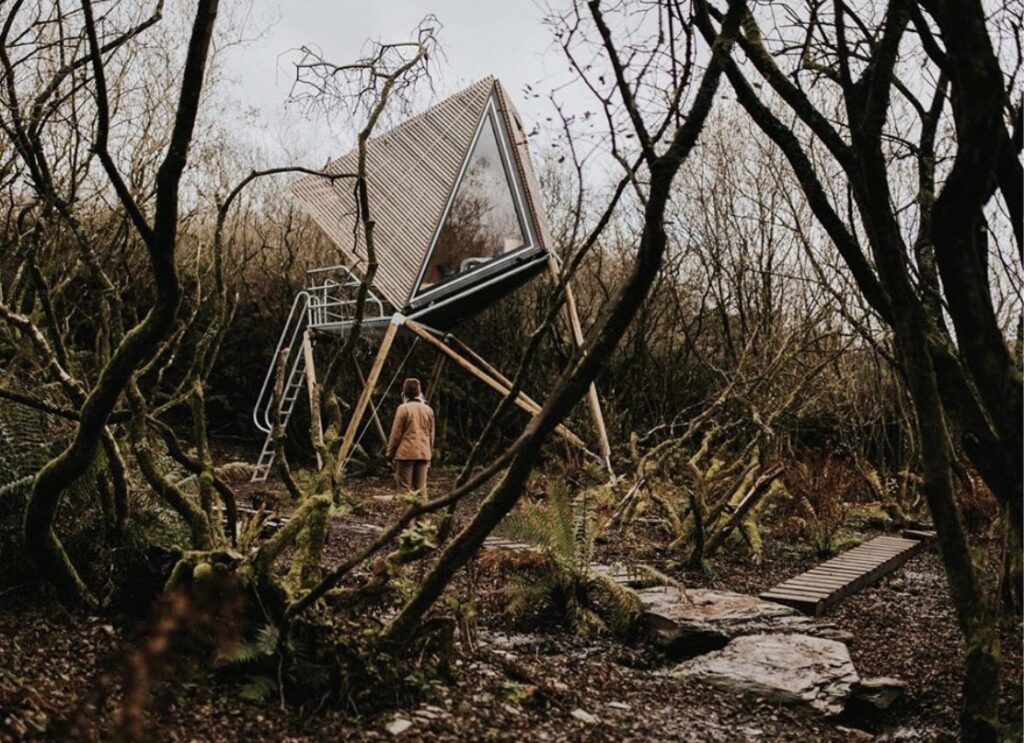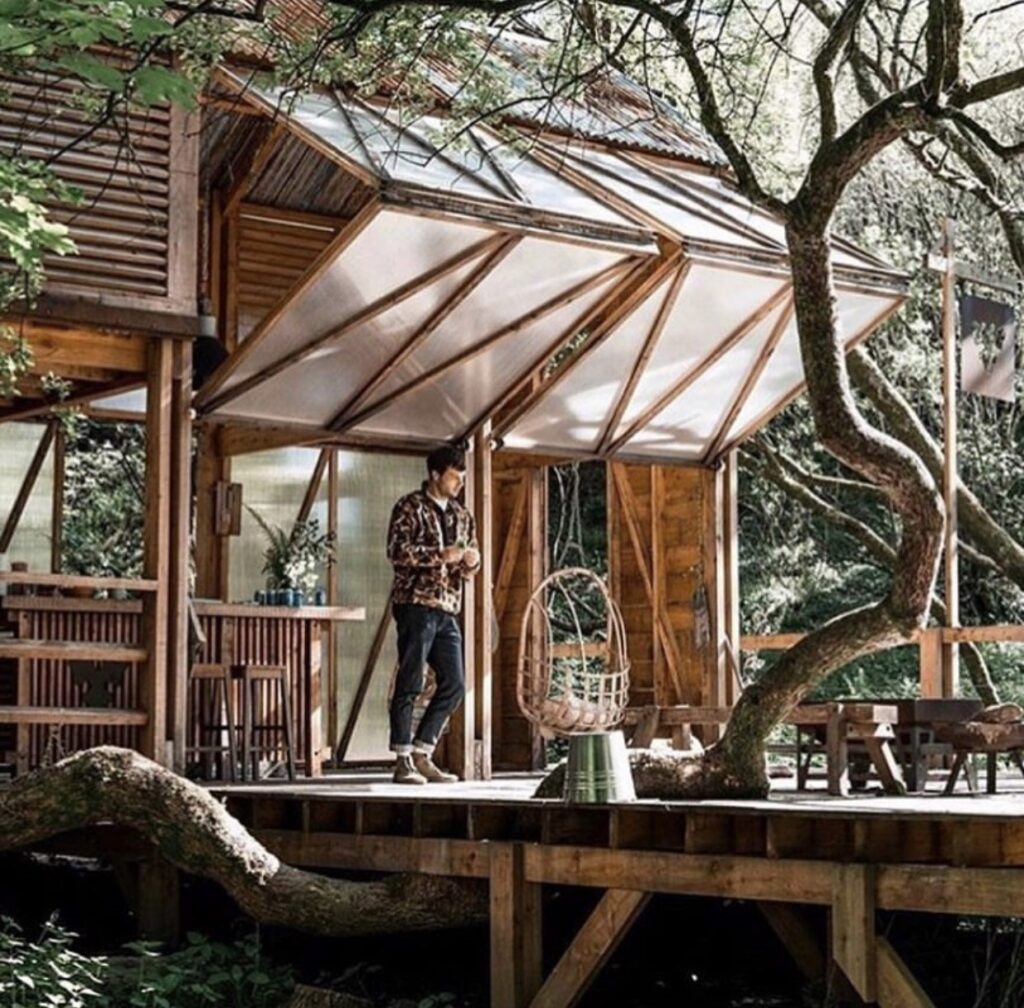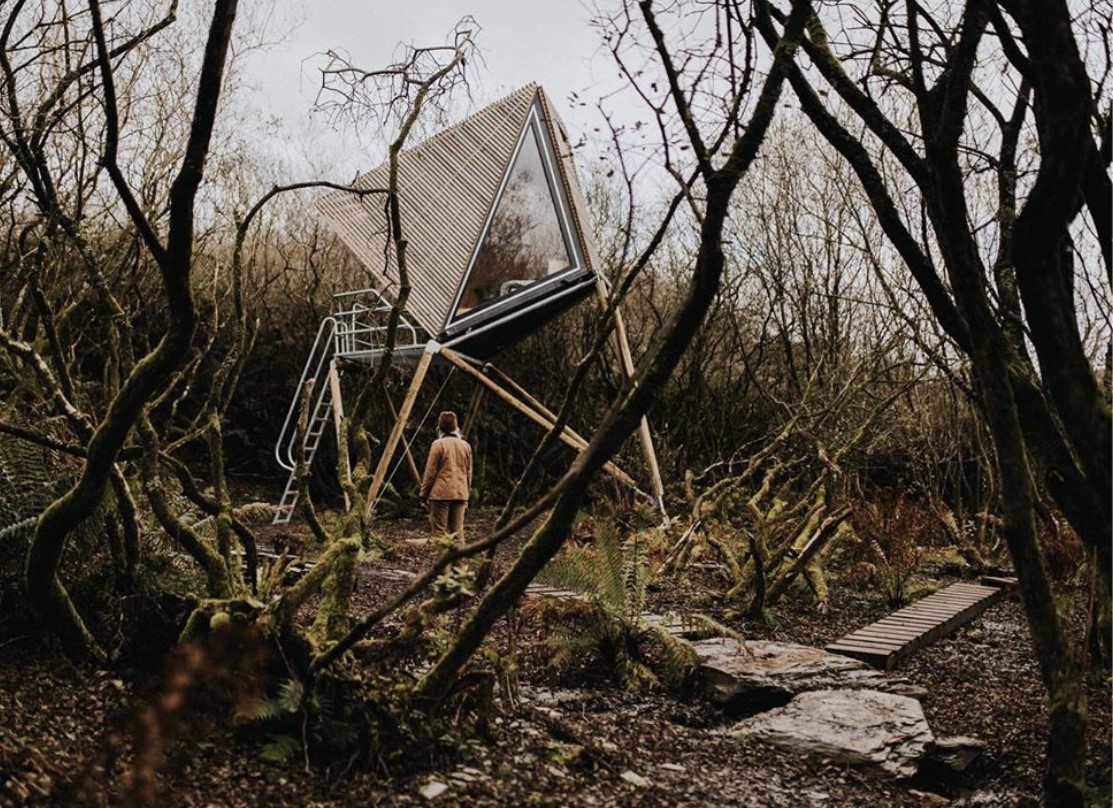The story of Kudhva ~ Cornish hideaways

With dirt under her fingernails, a tanned, weatherworn face and deep laughter lines around radiant brown eyes, Louise Middleton is a tough and beautiful woman. In her own words, ‘I drive around in big trucks, move mountains of slate, build roads and wield chainsaws – mans work is normal to me.’
Bravery, determination, an adventurous spirit and a relentless work ethic are just a few ways to describe her attitude to life, words often reserved for our male counterparts. She sees no point in setting limits or wasting time on frivolities. Ceramicist, artist and leatherworker, designer – she’s claimed all of these titles, sold her swimwear collection in Selfridges and worked with a world class milliner. In a past life, she spent three years sailing the Mediterranean, built a chalet in the Alps, a cob house in Devon and has travelled extensively.
Reliable sources tell me she’s been fiercely independent since childhood, fearlessley choosing the fastest pony and disappearing to India at the first opportunity. School was too dry, too constraining and most of her success has been self taught. She doesn’t blink at climbing scaffolding with a shoulder full of roof tiles or bombing down a black run. Without being an ardent feminist, gender simply hasn’t come into it. She just does things her own way.
It is this unusual combination of pluckiness and creativity that led Louise to sign a 999 year lease on a 45 acre abandoned slate quarry in North Cornwall and transform it into a Garden of Eden. That was three years ago. Some said it was madness, but her instinct convinced her otherwise. ‘Apart from the utter contentment I feel owning my own little piece of the planet, the sense of achievement in realising my dream is phenomenal.’ This plot quarried Penpethy blue slate for a couple of decades in the late 19th century and was one of many along this stretch of coastline to ship slate around the world. Piles of slate still teeter nervously around the site. Signing the lease for The Prince of Wales quarry, property of the Duchy of Cornwall ‘was a surreal moment.’
And so, Kudhva was born – ‘Architectural hideouts in unexpected places’ – more than a campsite, it’s a sanctuary, a haven, a wilderness. Off-grid living with spectacular views, a surf break and paths that criss-cross through giant ferns revealing an inky green reservoir and a forty foot waterfall. Neon yellow gorse, vivid purple heather and golden grasslands are just some of the flora and fauna so precious to the ecosystem. At the centre of this stage is a deserted Grade II listed Engine House, built in 1870, the only one of its kind in North Cornwall and much admired by local residents and visitors. It’s a classic Cornish scene, this giant of industry overseeing the land as he has done for generations.

Tough, by definition, is to be ‘strong enough to withstand adverse conditions or rough handling,’ and Louise had proved this time and again. Against all the odds, she has revealed the beauty of a rugged and inhospitable coastal outcrop and harnessed it to transform the lives of broken city dwellers and unhappy urbanites. The restorative qualities of nature are well documented and Kudhva (a Cornish word meaning Hideout) enables visitors to digitally detox and reconnect with themselves through nature, facilitating ‘an off-grid gap’ in your life’.
A painful end to a 15 year relationship meant that Louise needed to restore herself and force a gear shift. Very much a solo mission, she had something to prove, to herself and her three young sons, ‘The boys have been dragged along on this journey. Hopefully I am teaching them about a woman’s resilience and power. I pray that they will learn and benefit from the challenges I’ve had to overcome.’ The wild landscape has provided her with a space to discover, explore, forage and surf and is ultimately a place of purity and calm. ‘Owning a piece of land is like being in a relationship. I know every square inch of this place intimately. I see the seasonal changes, notice the wildlife, watch the weather changing across the horizon.’
But it wasn’t always this way. When I ask her about the many challenges she has faced she is candid, ‘Shivering in a cold caravan with only the dog to keep me warm was a low moment. I thought to myself, ‘What have I done?’ As a 44 year old divorcee with a great idea, but no real masterplan, I felt very alone. Chain-sawing through the undergrowth and then building a 1.5 mile road giving access to the site was tough. I had to dig deep, metaphorically and physically. I was scared about the dangers posed to the children, the chimney falling down, flooding….and of course the financial responsibility. That never goes away.’
Architect Ben Huggins from New British Design was instrumental in realising Louise’s unique vision and the hideouts are a design innovation in their own right. Their personalities complement each other – his energy and positivity combined with her blue sky thinking makes for a formidable pairing.
When it came to the accommodation structure, they were determined to design something entirely original, different from the cutesy cabin, middle class yurt or shepherds hut. The result is four modern day tree houses, geometric nests balanced upon eight stilts – angular and abstract, designed for purpose, no detail overlooked, internally comfortable yet not distracting. The aim is to facilitate a good nights sleep, whilst encouraging the visitor to get outdoors, feel the wind on your face and embrace nature.
Undoubtedly there are challenging elements at Kudhva – there is no electricity, fluffy towels or carpets – too much comfort would hinder any effort to ‘re-wild’. Louise thrives in this raw landscape without creature comforts. ‘That feeling of being outside all day, in the sea, on the beach….you get home and you’re exhausted. You haven’t stopped, you sleep deeply, the salt on your face stings. That kind of freedom is exhilarating.’
Crafted from larch and birch, the fifteen foot climb up a steep ladder purposefully detaches you from the world below. Close the door and enter another world. Windows allow glimpses of the black sea and white horses, viewing platforms maximise staggering ocean views and Gull Rock beyond. Above the tree line there is zero light pollution – adhering to natures rules, waking with the dawn chorus and sleeping as night falls begins to slow you down, your senses are revived. The solar shower and Swedish hot tub are a welcome bonus.
The twenty foot prototype was built in a cold barn in Tintagel, ‘It was freezing, and the resident cows kept peeing at intervals which was funny and actually very helpful as it kept us warm.’ The experience sounds bleak, but the she insists it was a lot of fun, thanks to her Cornish workforce with their ‘can-do’ attitude – a hardiness inherited, no doubt, from their mining ancestors. ‘Can you imagine the challenge of delivering the Kudhva to site down tiny lanes and positioning them into place with a crane? At the last minute, Ben and I changed our minds and moved the spot of one of the Kudhva – our driver couldn’t believe it!’ That ability to make a split decision at the last second highlights their clarity of vision.
‘That first Summer I wild camped with my sons just trying to feel the lay of the land, adjusting to nature’s rhythms, picking wild strawberries. It was my eldest son Hunter who discovered the reservoir – that was a magical moment. We knew it was there from the map, marking out the best spots like pirates. He found his way through the undergrowth to reveal this deep pool of refreshing water!’

The site has since grown to include The Danish Cabin, so called because it is built in the style of a traditional Summer cabin (sommerhus) in larch, without nails, glue or cement, assembled in just two days. Side walls open, shutters slide up and down, trees and branches grow through the two storey building, a stream gentle bubbles below. It was the result of a deal with drinks giant Carlsberg who filmed an off-grid bar at Kudhva and this was their parting gift.
Typical of Louise’s playful, sociable nature, she has connected with plenty of interesting characters locally with selected additions to the Kudhva experience. Everyone from a Wilderness Therapist, a Specialist Movement Coach, ex stockbroker surf instructor, yogi and environmental activist seamlessly offer their expertise and commit to this project wholeheartedly. It might all sound a bit new age, but you would be wrong to dismiss it. Exposure to the natural world is proven to increase self-esteem, provide a calming influence, aid concentration and reduce stress and anxiety. This is central to the culture at Kudhva, to give their guest some time, space and light to just ‘be’.
Not unlike the Japanese practice of forest bathing, Shinrin-Yoku – spending time in the forest and walking barefoot for better health and a sense of calm, a pillar of Japanese culture for decades. Caring for this special 45 acres of 100% organic land with its multiple habitats and circular economy is critical to the sustainability of Kudhva.
Louise has overcome the physical challenges of building Kudhva, but there is more to come. Plans for a sustainable live-work space in which large corporations can bring their workforce for ‘pure creativity’ experiences is in the pipeline. Planting wild juniper is a dream and educating herself about ecology is a lifelong commitment.
She shares her core values which are revealing, yet reflected in the daily life she has built around her – challenging perceptions, sustainability, raw intention, ruthless kindness, wild abandon, elevated experiences, off grid conversations. She has shown tenacity, adaptability and kindness. There have been difficult decisions, she has taken risks. She took a leap of faith into the unknown.
Kudhva will grow, evolve and continue to charm visitors – with those landscapes, how could it not? That perfect solar arc, where the sun sets and hits the sea is what people seek. As for its owner, that sense of adventure has always been there. Her masculine vigour and practical talents are tempered by a feminine compassion and a deeply romantic spirit. I couldn’t even guess what’s coming next – given the chance, she’d probably sail off in a dugout canoe down the Zambezi River. Just don’t underestimate her….
‘The truth is, you will never be ready and the only way to get ready for an adventure is to have one,’ Lois Pryce.
To find out more about this special place visit: http://kudhva.com/
If you would like to commission a feature, get in touch with Sarah here.

I like looking through your web site. Many thanks!